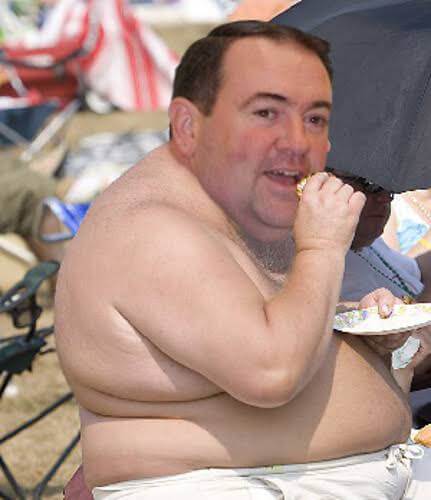 A collaborative partner of FitNet
A collaborative partner of FitNet A collaborative partner of FitNet
A collaborative partner of FitNetThe headline is a common excuse which people use to avoid weight training. Is it really true? Let us discuss on this today.
So let us start with the common belief amongst Indians. “I know building muscles and lifting heavy is good for health. But after I stop it I shall get fat. I prefer walking on treadmill or cycling. It’s easier to do and even after I stop it, I shall stay fit and not get bulky”.
Believe me, so many people around us, from zero to highly educated people, believe in this. And it’s not hard to believe. We see so many amateur bodybuilders, after a few years of strength training really got big and fat after getting away. They develop family pack bellies (losing that 6 pack) and biceps turning into even larger ‘fatceps’!
Yes it happens. Those big, muscular guys really develop too much fat. We have all seen it, there is no denying of this fact. But where is the catch? Everybody, who has some knowledge in exercise science, knows the importance of strength training. But this is the truth and the reason is simply lack of knowledge or lack of mental strength despite knowledge.

Let us discuss the points one by one…
Weight training burns lots of calories – As you stop it and start the sedentary lifestyle you have to consider this calorie deficit while taking food. The muscle guys enjoy lots of food and calories in their active life. As they stop it, they can’t cut down those calories not can suppress that hunger. Those extra energy find their way to fat cells.
Muscles are metabolically active tissues and burn lot of calories – Please remember what we have told so many times in this blog https://easyfitnessidea.com. Muscles are the most metabolically active tissues of our body and can really burn hell lots of calories. The regular lifters enjoy this fact and have really high metabolic rate. The basal metabolic rate or BMR of a muscular man is much more than a fat man of same weight. As you stop weight training some muscles (high calorie burner) get lost and fat (low calorie burner) accumulation occurs. No wonder same food intake for lower BMR actually makes you much fatter.
The afterburn or EPOC (excess post exercise oxygen consumption) is very high in weight training. This is a great benefit anaerobic energy pathway, that is seen in weight training. This effect is even more with bigger muscles like that of legs, back and chest and compost movements. Thus even after leaving the weight room, the body carries on burning calories and sometimes this burn exceeds the active burn during workout! This is an amazing benefit which they enjoy even 24 – 36 hours post workout. Once you stop regular training habit, you lose the benefit of extra calories burning. This needs to be addressed in dietary adjustment too.
Whole body weight training with proper intensity really improves the insulin sensitivity of body. This improved insulin sensitivity actually helps in calorie partitioning. Even carb tolerance is excellent and they are not afraid of taking lots of carbs. Even simple carbs are actually recommended just after training. Moreover, efficient glycogen depletion with resistance training stimulus is there in strength training. This actually drives more glucose towards recovery of glycogen stores and aids protein synthesis for muscle building. But as one stops the training habit, the sedentary life with our Indian genetics plays the trick. Insulin resistance develops and that extra glucose gets dumped in the fat cells (under the high glucose environment).
The heavy lifters can really tolerate hell lots of food and calories. The appetite and intake is high and their brain gets tricked that way. As you stop weight training, don’t think you appetite will drastically decrease. Moreover the high carb active lifestyle can’t be adjusted immediately after saying buy to the weight room. There has to be a psychological fight to find a right balance between your body and mind.
Normally, during muscle building, you have to be in calorie excess with extra carb intake. For the newbies even 100-150 kcal extra with the muscle training stimulus with proper intensity and progressive overloading, is enough to build up. They hit plateau at some stage but the calorie excess has to be there to carry on muscle building. This extra calories and carbs keep the leptin and metabolism in very good level and even day to day activities (subconscious movement, fidgeting, posture maintenance etc.) known as NEAT or non exercise active thermogenesis is actually very high. This is a gray area of fitness science which needs lots of research. As you stop the regular training habit and even try to get into low calorie and low carb habit, this NEAT really goes down. Thus you actually burn very less calories and get metabolically slow. You have to make huge dietary modifications to cope up with this problem.
So the bottom line is that the transition is huge from lifting to sedentary habit. You need to make huge dietary modifications in terms of total calories and carb intake. You lose the benefits of these with huge dietary changes:
Conclusion :
Thus, there are lots of physical, psychological and metabolic reasons for getting fat after leaving the habit. But that doesn’t mean you should not carry on this amazing habit. The regular habit of training is perhaps the best lifestyle modification possible.
Leaving this habit is not worth it, whatever be your career or lifestyle. And if you can’t overcome the inertia of starting out, don’t blame it on some damn excuse of getting fat.
The best option is never stop strength training till you breathe your last.


Facebook Comments